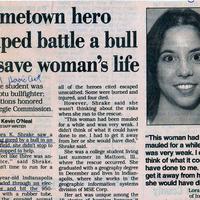Hey Guys,
I happened to catch a couple of interesting science podcasts with interesting perspectives on topics of interest to Buddhists.
The first is on regrets, and how some folks wallow in the negative aspects of perceived mistakes while others make them lessons to learn from for the future ... and why we tend to do each ...
Hidden Brain: Why We Can't Shake Life's 'Coulda, Woulda, Shoulda' Moments
I would say that our Shikantaza Practice tends to allow us to respect our mistakes honestly and take responsibility, learn from them, avoid wallowing and excessive self-flagellation but try to make amends, let ourself be human and fallible, and move on to trying not to repeat. It is a good way to be.
The other podcast is a surprising report (the last 20 minutes) on what makes heroes and altruistic behavior to risk one's life to help strangers. It makes the point that caring is vital, but being too empathetic may actually prevent such behavior. The real key to compassionate action may require a bit of emotional distance. As well, some very inspiring stories in this podcast:
Radiolab: How to Be a Hero
Gassho, Jundo
SatTodayLAH
I happened to catch a couple of interesting science podcasts with interesting perspectives on topics of interest to Buddhists.
The first is on regrets, and how some folks wallow in the negative aspects of perceived mistakes while others make them lessons to learn from for the future ... and why we tend to do each ...
Hidden Brain: Why We Can't Shake Life's 'Coulda, Woulda, Shoulda' Moments
Amy Summerville is a professor of psychology who runs the Regret Lab at Miami University in Ohio. She says a big part of why we struggle with regret has to do with the idea of rumination.
"Rumination is having thoughts spring unwanted to mind and we're chewing them over without actually getting anything new out of them, they're just repeatedly, intrusively, becoming part of our mental landscape. What we've found is that people who have ruminative regret, tend to be the people who are experiencing the most negative outcomes."
But Summerville says that while some people experience regret negatively, it's actually one of the more hopeful emotions.
"Rumination is having thoughts spring unwanted to mind and we're chewing them over without actually getting anything new out of them, they're just repeatedly, intrusively, becoming part of our mental landscape. What we've found is that people who have ruminative regret, tend to be the people who are experiencing the most negative outcomes."
But Summerville says that while some people experience regret negatively, it's actually one of the more hopeful emotions.
I would say that our Shikantaza Practice tends to allow us to respect our mistakes honestly and take responsibility, learn from them, avoid wallowing and excessive self-flagellation but try to make amends, let ourself be human and fallible, and move on to trying not to repeat. It is a good way to be.
The other podcast is a surprising report (the last 20 minutes) on what makes heroes and altruistic behavior to risk one's life to help strangers. It makes the point that caring is vital, but being too empathetic may actually prevent such behavior. The real key to compassionate action may require a bit of emotional distance. As well, some very inspiring stories in this podcast:
Radiolab: How to Be a Hero
Neuroscientist Robert Sapolsky says there is a certain kind of empathy that leads to action. But feeling the pain of another person deeply is not necessarily what makes a hero.
Gassho, Jundo
SatTodayLAH



Comment